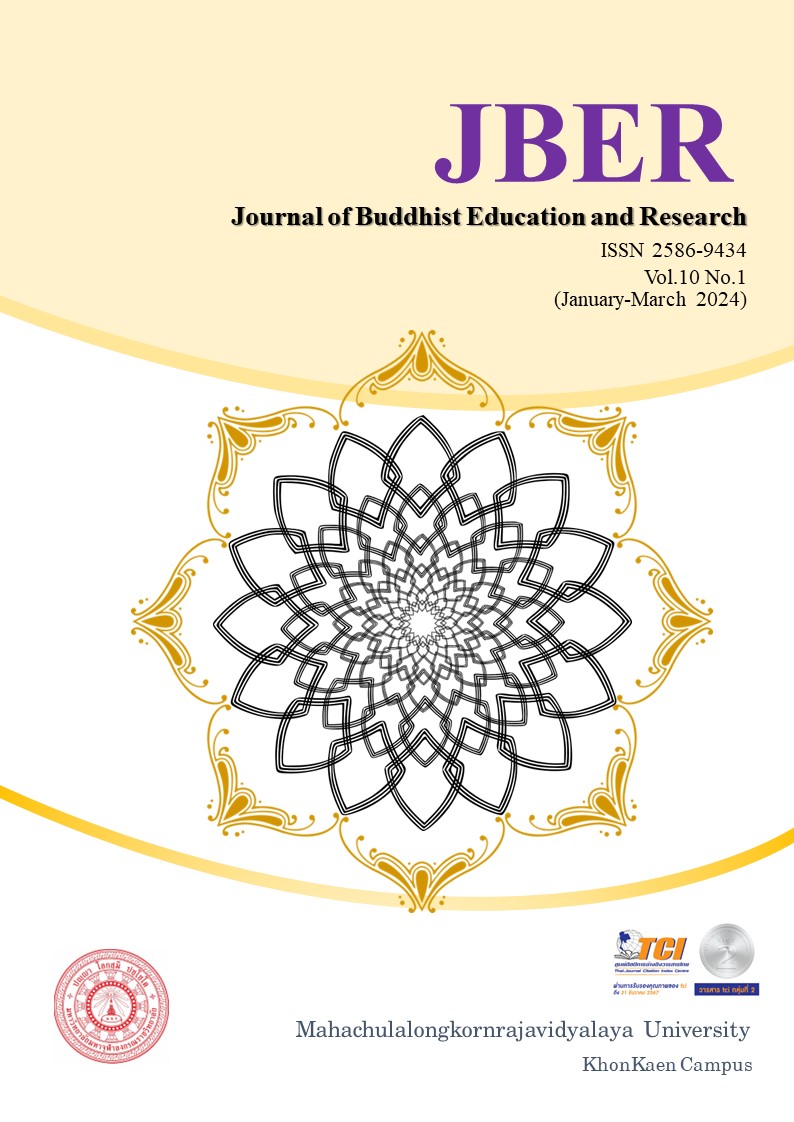GUIDELINES FOR THE DEVELOPMENT OF ONLINE TEACHING AND LEARNING FOR TEACHERS
Keywords:
Keywords: Instructional management conditions, Teaching and learning development, Online learningAbstract
Abstract
The purpose of this research is. 1) To study the level of teachers' opinions towards the development of online teaching and learning of teachers. 2) To study the conditions and needs of online teaching and learning of teachers that affect the guidelines for developing online teaching and learning management of teachers. and 3) to study the recommendations for the development of online teaching and learning among teachers. This study is a Quantitative Research Methodology. A questionnaire was used as a tool to collect data from 313 teachers under Uttaradit Primary Educational Service Area Office 1. Statistics used in data analysis were Frequency, Percentage, Mean, Standard Deviation. and analyzing Multiple Regression in analyzing the hypothesis set.
The results were found. 1) A study of the level of teachers' opinions towards the development of online teaching and learning of teachers. Overall, the opinions were at the highest level. 2) The condition and needs of teachers in online teaching, including general information, teaching methods, Problems in online teaching and learning and needs in teaching and learning of teachers affecting the development of online teaching and learning management for teachers Statistically significant at the level of 0.05. and 3) Teachers should make use of various technology tools such as Zoom, Google Classroom, and other online platforms to improve their teaching and learning experience. Data from online assessments should be used. student interaction and other sources of information.
References
เอกสารอ้างอิง
กระทรวงศึกษาธิการ. (2562). แนวทางการกระจายอำนาจการบริหารและการจัดการศึกษาให้คณะกรรมการ สำนักงานเขตพื้นที่การศึกษา และสถานศึกษาตามกฎกระทรวงกำหนดหลักเกณฑ์และวิธีการกระจาย อำนาจการบริหารและการจัดการศึกษา พ.ศ. 2550. กรุงเทพฯ: โรงพิมพ์ ชุมนุมสหกรณ์การเกษตรแห่ง ประเทศไทย.จักรกฤษณ์ โพดาพล, 2563:
จิรกิติ์ ทองปรีชา. (2563). การบริหารจัดการการเรียนการสอน ภายใต้สถานการณ์ COVID - 19 ระดับ มัธยมศึกษา พื้นที่โรงเรียนวชิรธรรมสาธิต เขตพระโขนง กรุงเทพมหานคร. กรุงเทพฯ: มหาวิทยาลัย รามคำแหง.
จุฬารัตน์ บุษบงก์. (2565). รูปแบบการเรียนการสอนออนไลน์โดยใช้เทคโนโลยีสารสนเทศในช่วงโควิด-19. วารสาร เทคโนโลยีและสื่อสารการศึกษา, 17(22), 92-103.
ธัชพนธ์ สรภูมิ. (2564). พัฒนาการจัดการเรียนการสอนออนไลน์ ด้วย Mobile Learning ในรูปแบบเชิงรุก
เพื่อพัฒนาศักยภาพของครูผู้สอน ในสถานการณ์การแพร่ระบาดของโรคติดเชื้อไวรัสโคโรนา 2019 (COVID-19). วารสารวิชาการการจัดการเทคโนโลยี มหาวิทยาลัยราชภัฏมหาสารคาม, 8(2), 48-62.
ธิติพล โทแก้ว. (2561). การพัฒนาแนวทางการจัดการเรียนการสอนออนไลน์สำหรับสถานศึกษาสังกัด สำนักงานเขตพื้นที่การศึกษามัธยมศึกษามหาสารคาม. Journal of Roi Kaensarn Academi, 7(5), 346-357.
นราศักดิ์ ภูนาพลอย. (2563). การพัฒนาการเรียนการสอนออนไลน์ด้วยการคิดเชิงออกแบบเป็นฐาน เพื่อสร้าง ผลงานสร้างสรรค์. กรุงเทพฯ: มหาวิทยาลัยเทคโนโลยีพระจอมเกล้าพระนครเหนือ.
บุญชม ศรีสะอาด. (2560). การวิจัยเบื้องต้น. กรุงเทพฯ : สุวีริยาสาส์น.
ปิยะวรรณ ปานโต. (2563). การจัดการเรียนการสอนของไทยภายใต้สถานการณ์การแพร่ระบาดของโรคติดเชื้อ ไวรัสโคโรนา 2019 (COVID–19). กรุงเทพฯ: สำนักงานเลขาธิการสภาผู้แทนราษฎร.
สำนักงานเขตพื้นที่การศึกษาประถมศึกษาอุตรดิตถ์เขต 1. (2565). ข้อมูลโรงเรียนในสังกัด. [ออนไลน์] เข้าถึง ได้จากhttps://www.utdone.net/. สืบค้นวันที่ 1 ตุลาคม 2565.
สำนักงานคณะกรรมการการศึกษาแห่งชาติ. (2560). แนวทางการประเมินคุณภาพภายในสถานศึกษา. กรุงเทพฯ: พิมพ์ดี.
Dunlap, J., & Lowenthal, P. (2018). Online educators’ recommendations for teaching online: Crowdsourcing in action. Open Praxis, 10(1), 79-89.
Martin, F., Budhrani, K., Kumar, S., & Ritzhaupt, A. (2019). Award-winning faculty online teaching practices: Roles and competencies. Online Learning, 23(1), 184-205.
Taro Yamane. (1973). Elementary Sampling Theory, Taro Yamane. Englewood Cliffs. New Jersey: Prentice- Hall. Inc. 1967. Pp. x–405.





